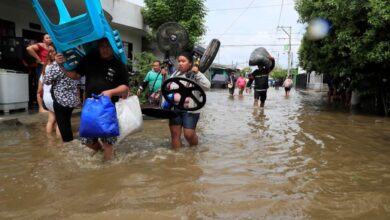Latin America in Short: Layoffs for Non-vaccination | Migratory Crisis in Colombia
The migratory crisis in Colombia worsens this week due to statements by the vice president. On the other hand, in New York, massive layoffs take place due to the vaccination requirement. All explained in our weekly summary.

Photos: Unsplash, Reuters
LatinAmerican Post
This week, the Colombian vice president has made new statements about the migration crisis in Colombia. In New York, on the other hand, massive layoffs were made due to the demand for a vaccine against COVID-19. In matters of science, it was shown this week that HIV can be treated with stem cells. As for the environment, this week the planet Earth exceeded the limits of plastic waste that it can exceed. Finally, in sports, the Winter Olympics close with the Kamila Valieva controversy. Everything summarized here.
Colombia closes the door to more Venezuelans
The Colombian Vice President and Foreign Minister, Martha Lucía Ramírez, stated this week that the country does not have the capacity to continue receiving the vast Venezuelan migration. According to her, Colombia has absorbed more than 30% of all Venezuelan migrants who have left the country.
“It is somewhat disproportionate, they are almost 30% of the total number of Venezuelan migrants who have left to date. Do we know if they are not going to be more? Do we know if new migrants are not leaving every day? How then can we assimilate them? Who is going to do it? Colombia does not have the capacity to continue assimilating new migrants or refugees from Venezuela,” the official explained.
The Colombian government once again called for “strengthening commitments and guaranteeing resources to assist those who are forced to leave that country” by the other OAS countries.
1,430 people were fired for not getting vaccinated
In the midst of the pro-vaccine and anti-vaccine debate against COVID-19, the city of New York ended up firing 1,430 employees who refused to receive any dose of any vaccine after having exhausted all the terms and extensions offered for several months.
In recent weeks, 40% of officials who had not been vaccinated agreed to receive their dose and thus keep their jobs. New York City is one of the areas with the highest vaccination rate in the United States, with more than 95% of adults having at least one dose.
Stem cells to cure HIV
This week we learned of the case of the third person to go into remission from HIV after undergoing a stem cell transplant. She is a middle-aged mestizo woman who, four years after being diagnosed with HIV, was diagnosed with acute myeloid leukemia. She was treated with chemotherapy, which caused her blood cells to be destroyed, so she received a stem cell transplant from one of her relatives that served as a bridge to, in 2017, receive stem cells from a newborn’s umbilical cord.
Three years after the transplant, the woman stopped taking the drugs to treat HIV and today the virus is not detectable. There are some umbilical cords that have a mutation in their blood that makes them resistant to the virus.
Plastic pollution exceeds limits supported by planet Earth
According to a study carried out by the Stockholm Resilience Center, planet Earth can no longer support the plastics and chemical products that humanity has produced. Bethanie Carney Almroth, co-author of the study, assures that it is urgent to limit production, since this can critically affect the “functions of planet Earth and its ecosystems.”
The study shows that there are more than 350,000 synthetic products that humanity has invented and that today are found by tons in the environment and even in the atmosphere. Within the international discussions to deal with climate change, negotiations on plastic pollution will have to enter, says Carney.
Kamila Valieva finishes fourth in figure skating
Kamila Valieva, the teenager who was given the green light to participate in her competition after failing a drug test, missed out on the figure skating podium at the Beijing Winter Olympics. Valieva finished with an overall score of 224.09, trailing third place Japan’s Kaori Sakamoto. The gold medal went to her compatriot Anna Shcherbakova and the second place also went to a Russian, Alexandra Trusova.




